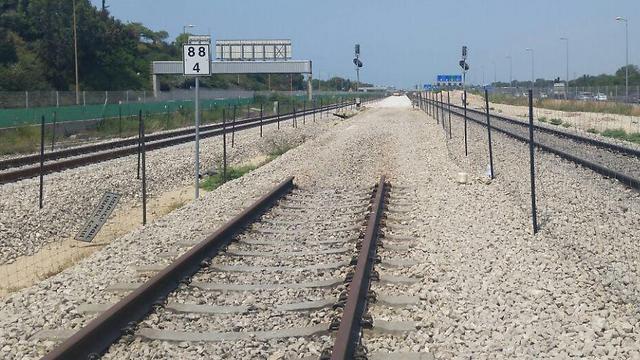
Katz and Netanyahu sitting side by side on the weekly cabinet meeting
צילום: AFP
Netanyahu is trying to get rid of Katz
Op-ed: The prime minister couldn't resist an opportunity to lay the blame for the train fiasco on his biggest rival in Likud, Transportation Minister Yisrael Katz, but by doing so he managed to anger both the ultra-Orthodox and the general public.
Someone needs to be held accountable and pay the price for the colossal damage—no less—done to a large part of the public, who spent its Saturday night and Sunday morning stuck in traffic. Someone needs to provide an acceptable explanation to the thousands of soldiers who had to find alternative ways to get back to base this morning. And to us, the general public, who watches flabbergasted as a belligerent, inter-party political dispute paralyzes an entire country.
A crazy country: There is no other way of describing what's going on here. Every time we think we've reached a new low of cynicism, paranoia and distrust—it turns out things could be worse, and that we've yet to see it all.
Let us not be confused: There is nothing else to this. Don't let anyone tell you tales. It's all politics—pathetic, petty, interest-based, self-centered politics. There's a power struggle here, a fight over authority and credit. This is something that in a normal country would not have affected the operations of the train system.
On Saturday night, Prime Minister Benjamin Netanyahu accused Transportation Minister Yisrael Katz of holding an entire public hostage, of trying to mount a putsch and dismantle the coalition—all sorts of things.
But I believe that the question everyone in Israel is asking is: Where is the prime minister? Who should take responsibility over the fact there is a crisis in the coalition, the likes of which we haven't seen in years; that the status quo, which has been working for years in peace and quiet, was so blatantly violated; and that a crisis artificially created to undermine a minister instead hurt an entire country?
There is one sentence that perfectly sums up the fiasco that has been going on here over the past 24 hours: "He who digs a pit will fall into it."
The prime minister tried to incite his ultra-Orthodox coalition partners against Minister Katz while making promises to them that he cannot keep—and found himself deep in a pit he will have a hard time climbing out of.
The escalation of the conflict with Katz and the strange statements coming out of the PMO, as well as the pathetic interview the PMO's chief of staff, Yoav Horowitz, gave Channel 2—were all meant to draw fire away from the fact the prime minister completely capitulated to the ultra-Orthodox parties. We can only hope that Horowitz was better at selling cars than he was selling us on explanations for Netanyahu's actions.
After making promises, establishing a committee to handle the issue of work on Shabbat, and having dragged, as Minister Litzman described it, the ultra-Orthodox to do what they would never do—authorize work on Shabbat—Netanyahu managed to get in trouble with both sides: The ultra-Orthodox and the general public. He did what no one before him had done—force the ultra-Orthodox, who normally look the other way and accept the situation as it is, to oppose something that has been working fine for years now. It's as if he forced open Litzman, Gafni and Deri's eyes, making them see what they didn't want to see, while telling them: 'Look, can't you see? They're working on Shabbat. What do you have to say about this? Aren't you going to do anything about it?'
And it's not like the prime minister doesn't know what's been going on in Israel all of these years. He's supposed to know the law and the procedures regarding work on Shabbat. He's supposed to know the law allows work on Shabbat not just in cases of ‘Pikuach Nefesh’ (a Jewish principle which permits most transgressions, such as violating Shabbat, if a life is at risk), but also for vital works. He's supposed to know the police opinion that determined these works must not be done during the week, as it could endanger lives.
He knows that when Deri was the economy minister, he issued permits to work on Shabbat, and when Netanyahu replaced the Shas leader, he himself issued such permits. In fact, it's quite possible many of the permits that are supposed to be used for the train works were given while Netanyahu was the economy minister.
But the urge, oh the urge! Netanyahu could not miss an opportunity to put the blame on Katz, the strongest minister in the Likud party today. Those in the prime minister's inner circle are fanning the flames, encouraging him to get rid of Katz. Netanyahu's instincts, driven by paranoia and distrust, are pushing him towards the inevitable—getting rid of his successful minister.
Netanyahu's problem is that Katz is not just any other minister. He's not Gideon Sa'ar, Moshe Kahlon or Moshe Ya'alon. He won't quit politics and wait on the sidelines for the right moment to return to center stage. He'll stay close. Close enough to breathe down Netanyahu's neck. He will stay in the faction and invest his time in politics. Lots of politics. Or in other words: He will be a thorn in Netanyahu's side.
If I were Netanyahu, I would do anything to prevent that from happening. The last thing he wants right now is for the head of the Likud secretariat, Yisrael Katz—who is close to the head of the Likud center, Haim Katz—to have time on his hands. Lots of time.
If I were Netanyahu, I'd be trying to claw my way back out of the pit he fell into.













